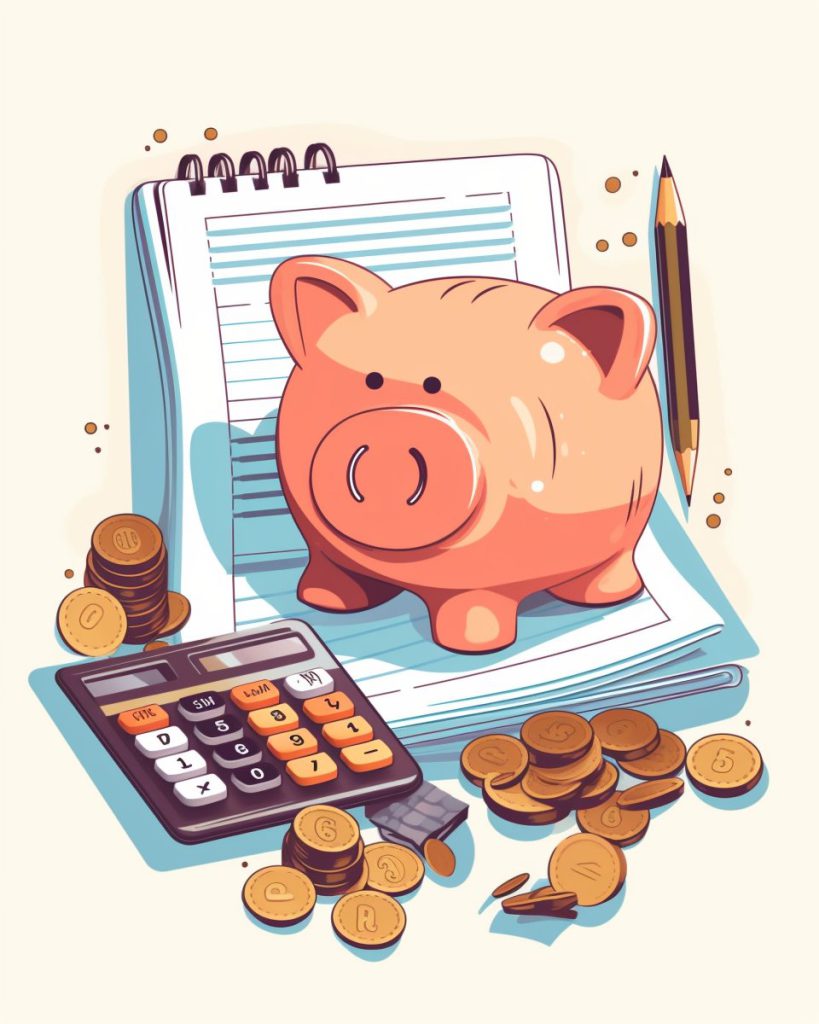What is Financial Self-Care? + Checklist

Self-care and wellness encompass more than just looking after your physical, mental, or emotional well-being. Financial self-care is crucial for maintaining control of your finances as you work toward financial objectives like saving money or paying off debt. Additionally, it can prevent unpleasant shocks like missed deadlines or unanticipated costs. Creating a weekly financial self-care routine is the first step in establishing good money habits that will last a lifetime.
Would it surprise you to learn that financial stress is one of the primary external causes of mental health problems among individuals globally? 53% of US citizens with high student loan debt levels claim to have suffered from depression due to their debt. The worst part is that the effects of financial stress will only worsen over time if you don’t make an investment in yourself and deal with these problems head-on.
“Your financial situation directly impacts your security and general happiness, which is crucial to your quality of life.”
To make it simple for you to include financial self-care into your everyday life, we will define it in this post before offering suggestions for creating a routine. This post is for you if you lack financial stability and don’t give a damn about taking care of your finances. Read it through to the end.
What Is Financial Self-Care
A type of self-care that emphasizes financial well-being is called financial self-care. The ideal method for managing your money and enhancing your financial status should be found. Although it may not seem enjoyable, worrying about debt, paying bills, and not saving enough money may all result in high levels of stress that can be physically and psychologically exhausting. Remember that self-care and finances may coexist.
Financial Self-Care Examples
Making specific plans and goals to create a better financial future, discovering strategies to promote a healthy money attitude, and concentrating your time and focus on your financial condition are all examples of financial self-care.
Also interesting and informative
Click on the box below & read the “Top 5 Financial Self-Care Examples” post right now.
Financial Self-Care Checklist
We all deserve relaxation, a nice stroll, quality time with friends, and fun. Practicing basic financial, mental, and physical self-care in a society where we continuously face financial decisions is crucial.
A little consideration should go into your financial life so that you may be in charge and prepared for the future. Here is a quick financial checklist you may use to start practicing financial self-care.

1. Pay Attention to Your Emotions
“Which financial decisions left you feeling satisfied, and which left you feeling remorse or guilt?“
Pay close attention to how you are feeling about the financial decisions you have previously made; this is the first step in developing self-awareness about your financial decisions.
2. Accept Your Bank Account
It is simple to neglect your credit card and bank account reports, and it may be difficult to analyze your accounts. But is it more stressful than allowing anxiety to rule your life and failing to check your balances? So accept your bank account.
3. Consider Your Spending Habits
Look for patterns in your expenditures and pay attention to unnoticed behaviors that conflict with your underlying principles. Ask yourself the following questions:
- When do you typically spend more money?
- What are you most willing to spend on?
- How much of your spending doesn’t align with your principles?

4. Don’t Subscribe till You’re Certain
Identify recurring charges for services or products you never use and cancel them. It’s essential to thoroughly consider if you want to do anything regularly before subscribing to it.
5. Return Unnecessary Purchases
It’s OK to return an item and receive a refund if you buy something and then realize you made a mistake. Feel free to return what you bought.
Financial Self Care Ideas
The items above help make the first moves. However, they need to be more. It would be best to have a more comprehensive strategy and broader tactics to implement financial self-care in your life successfully.

Below, we have described some examples of financial self care ideas.
Set Realistic Financial Goals

Your goals must be sensible and achievable since you will take action to improve your financial status. Doing so allows you to progress and get a boost when you eventually accomplish a goal. It is preferable to begin repaying loans with the highest interest rates.
Analyze your monthly costs and income to see how much is left each month. After subtracting all essential costs from your monthly income, you can pay off your debts using the leftover money.
Check Your Bank Accounts Regularly
To achieve your financial objectives, learning about effective cash management is crucial. Checking bank account balances daily, or at least a few times each week, might be useful. You’ll be aware of your financial situation and won’t be taken off guard by a low balance. Using this approach, You may examine the effects of automated bill payments on your cash flow in further detail.
Most of us need to be made aware of our financial activities. You will get a rough idea of your financial condition if you routinely check your bank

accounts. Knowing your financial situation in detail might give you more control and help you make smarter purchase decisions.
Keep Daily Expense Records

Hot-headed shopping binges are something that we all like since they make us feel good at the moment. However, this sort of spending might seriously harm your financial status. You may be more conscious of your expenditures by checking your finances daily and concentrating on where your money was spent. You might need to find out how much money leaves your pockets daily. Tracking expenses will make that clear.
“Give yourself a big high-five when you don’t spend much; By increasing your money, you’ve taken care of your financial needs.“
Focus on Paying off Your Debts
You would be one step closer to reducing some financial stress in your life by giving debt priority. Eliminating debt may be a crucial component of financial self-care and can increase your level of happiness.
You may have some debt, but it may be stressful. Debt may accumulate and be hard to pay off because of interest fees. It’s a miserable cycle. If you have extra cash, you could treat yourself to a designer outfit or a weekend excursion to improve your mood. Alternatively, reduce your debt.

Adjust Your Monthly Budget
It is best to examine your monthly budget goals once you have kept track of your spending patterns and account balance at the end of each month. For two reasons, you should review your monthly financial goals:
It would help if you verified that your budgeting was done accurately. Do you have a strategy for your income, or do you just let your money go where it goes? Are you genuinely sticking to this strategy? Do your out-of-home meals prevent you from meeting your monthly budget goals? Do your unused subscriptions make it harder to spend more money on entertainment?

After establishing overarching objectives for your financial self-care, you may divide them into more manageable targets and set them as your monthly budget goals. Feel free to adjust your monthly budget to achieve more crucial objectives.
Boost Your Financial Skills

Because most people need a foundational understanding of finance, money may be daunting. Even if you didn’t study money management in school, you might educate yourself on finance fundamentals and more.
Spend some time reading up on complicated financial matters, from understanding credit ratings to understanding the fundamentals of investing. Explore applications that can track your spending, help you save money, and create a budget. These resources can contribute to your financial self-care and increase your wealth and financial knowledge.
Consider reading Robert Kiyosaki’s books to broaden your understanding of investing and money. Among the books I began with were “The Richest Man in Babylon” by George Samuel Clason and “Rich Dad, Poor Dad” by Robert Kiyosaki.
Invest in Your Retirement
Financial self-care entails attending to both the requirements of the now and the future. Consider how you would like to live when you reach retirement age. Retirement is a long way off. In this manner, even if retirement is far off, you could feel more inspired to save. To discover if there is an opportunity to increase your retirement savings, take another look at your budget. Even 1% more in monthly savings may have a massive effect.

Improve Your Financial Approach
Our emotional and physical health correlates with how well we care for ourselves. Being depressed over money may be unpleasant. Because of this, concentrating on what you do have rather than what you lack might be beneficial. Your comparison framework may be biased if you feel you can’t compete with other people’s lifestyles. Delete social media (or unfollow certain luxury accounts), and give up reality TV.
An essential first step is realizing your financial potential rather than feeling deprived. Adopting this perspective may be quite empowering.
Invest, Earn, and Invest Again
My issue was that I had been trained to save a percentage of my income since I was a small kid. But they omitted to inform me what I should do after saving money. I was still trying to figure out what to do with my saved money. Saving is pointless if I’m going to squander the cash again. What I discovered was that savings should be put into investments.

Several investment strategies depend on a person’s personality, risk-taking, and risk aversion. An investing strategy may not work for me, but it could be the best for you. The essential thing is to use the saved money for investing as soon as possible, regardless of your selected investment strategy. You may generate passive income in this manner. In other words, instead of investing your time, effort, and freedom in earning money, you allow your money to take care of it.
The revenue from your investment should ideally be reinvested. In this manner, both your investment and your earnings will compound. You may significantly raise your portfolio value over time using the “compound effect.“
Tip
I suggest reading “The Compound Effect” by Darren Hardy to learn more about this concept.
HealWiser‘s Last Piece of Advice
Financial self-care is just as crucial as more conventional self-care practices like visiting a spa or taking a personal day off from work, if not more so. You may lessen the financial stress and get closer to your short- and long-term objectives when you give financial self-care a high priority. As a result, you may enjoy yourself more.
I hope this post helps you improve your financial self-care. I would love to read your thoughts in the comments.


